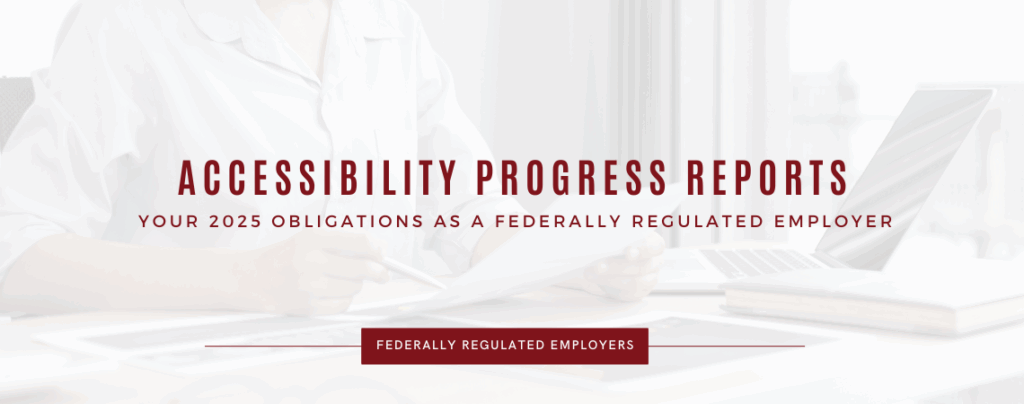
If you’re a federally regulated employer in Canada, your accessibility progress report is due June 1st 2025.
There’s a lot to do, and not a lot of time.
Federally regulated employers in Canada are approaching a key milestone in advancing workplace inclusion: the next wave of accessibility progress reports under the Accessible Canada Act (ACA). This legislation, which aims to create a barrier-free Canada by 2040, requires employers to be proactive in identifying, removing, and preventing barriers to accessibility in the workplace.
If your organization falls under federal jurisdiction, you’re legally required to meet specific accessibility planning and reporting standards.
Understanding your 2025 obligations is essential to remain compliant, avoid penalties, and contribute to a more inclusive Canada.
If you’re feeling overwhelmed or not sure where to start – keep calm and read on!
What Are Accessibility Progress Reports?
Accessibility progress reports are annual updates that demonstrate how your organization is advancing the goals laid out in your accessibility plan.
These reports are not optional — they're a legislative requirement under the ACA.
Your Accessibility Progress Report Obligations
Your progress report must include:
- Information received through the feedback process
- How your organization has considered that feedback
- How your organization consulted people with disabilities when preparing the progress report
- Progress made on eliminating identified barriers in your accessibility plan
- Actions taken to implement your accessibility plan
- Adjustments or updates made to your plan based on learnings from the feedback process
After you’ve put together your progress report, next steps include:
- Publishing your progress report in an accessible format on your website.
- Notifying the Accessibility Commissioner via the My Accessibility Portal within 48 hours of publishing your progress report. Notifications must include one of the following:
- The URL or hyperlink address of the accessibility plan, feedback process description and progress report, or
- the mailing addresses of the places of business where the accessibility plan, feedback process description and progress report are displayed.
Your accessibility plan and progress reports are audited by the Accessibility Commissioner. Failure to comply with these requirements could result in fines of up to $250,000 per violation.
Reporting Made Easy with Our Free Template
We understand that reporting can feel overwhelming — especially if you're unsure where to start. That’s why we created a free Accessibility Progress Report Template designed specifically for federally regulated employers.
Need Hands-On Help? We’ve Got You Covered.
At Envol, we take a pragmatic, people-first approach to compliance.
We’ve supported dozens of federally regulated employers across Canada in creating clear, compliant, and realistic accessibility plans and progress reports that meet legal requirements.
If you need help drafting or reviewing your report before the June 1 deadline, let’s connect so we can take it off your plate.
FYI: Additional Employer Obligations
1. Accessible Transportation for Persons with Disabilities Regulations (ATPDR)
If your organization is a transportation service provider – such as airlines, railways, ferries, or interprovincial bus services – you are subject to the ATPDR. These regulations establish comprehensive accessibility requirements across various transportation modes. They are enforceable under the Canada Transportation Act and include specific obligations for carriers and terminal operators.
2. Canada Transportation Act
Beyond the ATPDR, the Canada Transportation Act mandates that federally regulated transportation modes be accessible without barriers to persons with disabilities. This overarching requirement reinforces the importance of compliance with accessibility standards in the transportation sector.
3. Broadcasting Act
Broadcasting entities regulated by the Canadian Radio-television and Telecommunications Commission (CRTC) must adhere to accessibility obligations under the Broadcasting Act. This includes publishing accessibility plans, establishing feedback processes, submitting progress reports, and notifying the CRTC within 48 hours of publishing these documents.
4. Telecommunications Act
Telecommunications service providers (TSPs) are also governed by the CRTC's accessibility regulations under the Telecommunications Act. Similar to broadcasting entities, TSPs must publish accessibility plans, feedback mechanisms, and progress reports, and notify the CRTC accordingly.